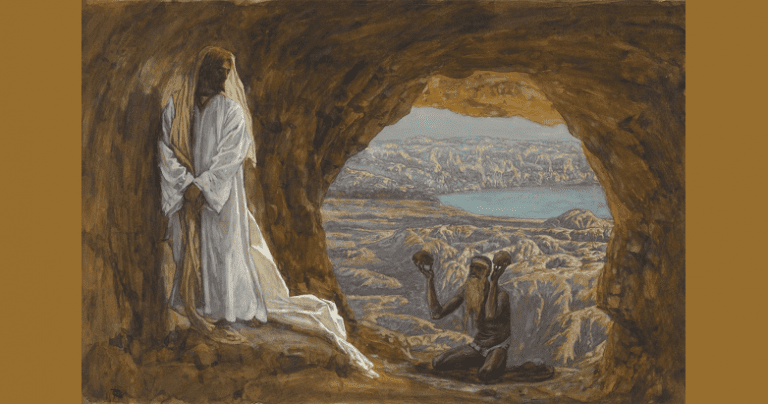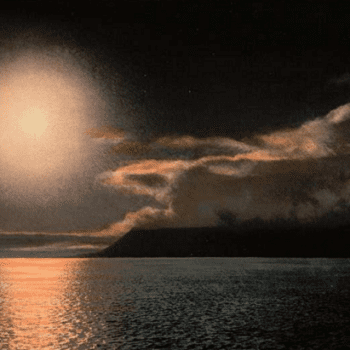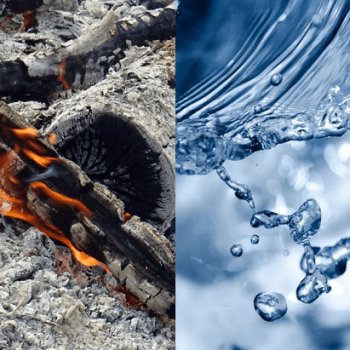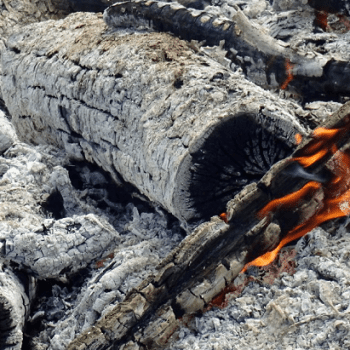
Matthew 4:1-11. The First Sunday of Lent.
We meet in the Scriptures, the Gospel and the Sacraments not only our salvation, but also God who is to be worshiped.
The event we witness in the Gospel today, the event of Christ’s retreat, penance and temptation in the desert, starts right after his baptism at the river Jordan.
This two-sided event of Christ’s baptism and his forty days in the desert was the beginning of his public mission.
It is an event of our salvation, but only because it is an event that reveals the One True God: Father, Son and Spirit.
At the Jordan River and in the desert we have first and foremost a proclamation and a presence of God.
If we look closely as Christ emerges from the waters of the Jordan and the Spirit drives him into the desert, we find a key or a lens for reading the whole of the Gospel, the whole of Christ’s work two-thousand years ago and the whole of God’s continued work in grace, the liturgy and the Church.
At the Jordan River, we witness that heaven is open and has a voice.
This is a mysterious image of God.
We are able to name this heavenly voice “The Father” only because this voice reveals a Son.
As Christ emerges from the water, the voice of the Father emerges from heaven to uphold three truths.
- You are my Son.
- You are my Beloved.
- You are the One Who Pleases Me Greatly.
Then two more signs from God appear on this day that starts at the Jordan and ends in the desert.
First we see that the Spirit of the Father rests upon the Son.
Then, driven by the power of the Spirit Christ departs into the desert.
There in the desert, by the power of the Eternal Spirit, Christ offers himself to the Father in hunger, thirst, exposure, vulnerability and solitude.
Here already we see self-sacrifice.
It is the same self-sacrifice that we see on the Cross and in the Eucharist.
Here we recognize fully present the grateful obedience and the sacrificial gratitude of the Son in his love for his Father.
Much later in time, the letter to the Hebrews [9:14] will testify that Christ “through the eternal Spirit offered himself without blemish to God”.
After the Jordan and the desert, nothing substantially different really happens in Christ’s life and public ministry.
In Christ’s life and preaching, in his good works, in his miracles, in his healing of the sick and raising of the dead, in forgiving sinners, in his own passion, death, resurrection and ascension, in his sacraments now in the Church— in all of these we witness the same realities that were present and revealed at the Jordan and in the desert:
- the love of the Father is revealed;
- the power of the Spirit is revealed;
- the obedient gratitude of the Son is revealed.
In all these revealings, we worship the One True God in whom we find our salvation.
The penance of Christ in the desert points to the naked truth of humanity’s original relationship with God.
It reveals the naked truth of the divine Son’s relationship with the heavenly Father.
The penance of Christ in the desert reveals the deep meaning and power of penance.
Sin hides.
Penance exposes, leaving us naked, hungry and vulnerable.
Penance is our first deliberate step in loving God, because love cannot grow in those who forever protect themselves.
Sin hides.
Penance deliberately exposes.
Christ began his ministry of love by doing penance.
Then he began his public preaching by calling for penitence:
Repent, for the kingdom of heaven is at hand. [Mt. 1:17]
The time is fulfilled, and the kingdom of God is at hand; repent, and believe in the Gospel. [Mk. 1:15]
The love of God and the power of his Spirit do not grow in us without the willing vulnerability that penance can bring about in our lives.
In sin, Adam hid the nakedness of his body from God.
In the Eucharist, Christ exposes to us and to the Father the vulnerability of his Body and Blood.
That is a paradox, for in the vulnerability and sacrifice of his Body and Blood he reveals and gives to us the power of the Spirit and the love of the Father.
Christ’s baptism at the Jordan, his penance in the desert, his preaching, his ministry and his whole Gospel all coincide with his Eucharist and his Cross.
In the Eucharist and on the Cross, the vulnerability of Christ is a willing vulnerability unto death.
Greater love than this, there cannot be.
Sin obliges us to do penance, for in sin we refuse to love.
Through penance we can begin to learn our freedom to love as Christ loved.
For this reason, we always observe the penance of at least a brief fast before we receive the Eucharist.
We do that penance and all penance for the sake of love, for in the Eucharist we receive the challenge, the example and the event of love exposing its naked self.
Turn. Love. Repeat.
Dear Readers of “Turn. Love. Repeat.”
California where I reside had a new law go into effect on January 1, 2020. California Assembly Bill 5 forbids freelance writers, editors and photographers from providing more than 34 content submissions to a media organization per year unless the organization hires the freelancer as a salaried employee. Patheos is a media organization, and I am a freelancer. So now I must limit my posts to 34 per year, or 1 post about every 10 days.
So as not to exceed my legal limit, between my postings here at Patheos I will publish my “extra” pieces at my personal blog, Monk Notes.











